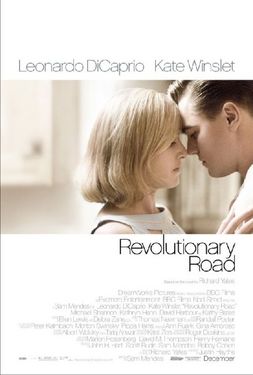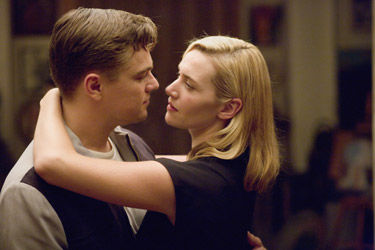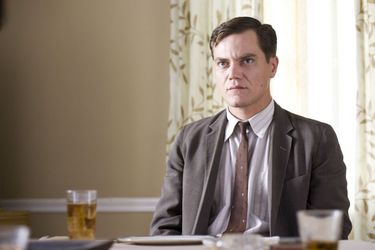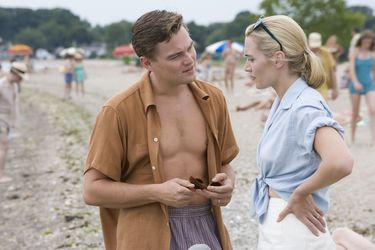Revolutionary Road

 They play Frank and April Wheeler, respectively - Two people who met at a party, married young, and have spent most of their lives since chasing the 1950s vision of the American Dream, while ignoring their own personal desires. April had dreams of being an actress at one point, but her career never went anywhere, and she now mainly serves as the dutiful housewife, looking after their kids and entertaining the neighbors. Frank never really had any concrete dreams, and has resigned himself to working at a job he hates, the occasional romantic affair with a female co-worker (Zoe Kazan) being the only joy he gets out of life. The movie throws us headfirst into their problems, as we find ourselves in the middle of a particularly tense argument during a drive home in an early scene. The opening moments are shown out of sequence, with flashbacks filling us in on how they got to this point. As April reflects on the idealistic individuals they were in their 20s when they first met, she begins to realize it's not too late to live their dreams, and suggests they sell everything and move to Paris.
They play Frank and April Wheeler, respectively - Two people who met at a party, married young, and have spent most of their lives since chasing the 1950s vision of the American Dream, while ignoring their own personal desires. April had dreams of being an actress at one point, but her career never went anywhere, and she now mainly serves as the dutiful housewife, looking after their kids and entertaining the neighbors. Frank never really had any concrete dreams, and has resigned himself to working at a job he hates, the occasional romantic affair with a female co-worker (Zoe Kazan) being the only joy he gets out of life. The movie throws us headfirst into their problems, as we find ourselves in the middle of a particularly tense argument during a drive home in an early scene. The opening moments are shown out of sequence, with flashbacks filling us in on how they got to this point. As April reflects on the idealistic individuals they were in their 20s when they first met, she begins to realize it's not too late to live their dreams, and suggests they sell everything and move to Paris. Frank is skeptical at first, but quickly realizes it's feasible. He's earned more than enough money at work, and April keeps on assuring him she could get a secretarial job that could keep their entire family living comfortably, since she's heard they pay more in Europe and the cost of living is cheaper. With her supplying the money, Frank can be free to discover himself and what he truly wants to do with his life. The excitement of leaving their "suburban prison" is enough to rekindle their love, and their relationship seems stronger than ever. Then Frank is offered a promotion at his current job. It means more money, yes, but it also means they have to stay put if he wants it. It doesn't help matters that Frank's friends are openly against the idea of him heading off to Paris and living off of his wife. Maybe he feels a bit threatened himself, and feels this promotion is a chance to hold onto what little authority he has in his life. There are other developments that come in the way of their dream, and little by little, we watch it die along with their rekindled relationship.
Frank is skeptical at first, but quickly realizes it's feasible. He's earned more than enough money at work, and April keeps on assuring him she could get a secretarial job that could keep their entire family living comfortably, since she's heard they pay more in Europe and the cost of living is cheaper. With her supplying the money, Frank can be free to discover himself and what he truly wants to do with his life. The excitement of leaving their "suburban prison" is enough to rekindle their love, and their relationship seems stronger than ever. Then Frank is offered a promotion at his current job. It means more money, yes, but it also means they have to stay put if he wants it. It doesn't help matters that Frank's friends are openly against the idea of him heading off to Paris and living off of his wife. Maybe he feels a bit threatened himself, and feels this promotion is a chance to hold onto what little authority he has in his life. There are other developments that come in the way of their dream, and little by little, we watch it die along with their rekindled relationship. Based on the novel by Richard Yates, and working from a screenplay by Justin Haythe, Revolutionary Road could be considered a return to the themes in Mendes' debut film, American Beauty, as both films deal with the dysfunctional truths that go on behind the perfectly maintained suburban lawns and gardens. That's about where the similarities between the two films end, though. Beauty was a darkly satiric look about a husband and father who realized life was too short for the existence he had decided to settle for. Watching Frank Wheeler, we get the sense that even though he complains about having to settle, he has a strange contentment with where he is in life. Paris offers a chance to discover himself, yes, but it also offers failure. What if he never found himself? Frank would argue that he'd rather be a face in a crowd with something to do at least, than someone who stood out, tried, and failed. As for April, Paris represents everything she's wanted, while the place where they currently live represents everything she thought she wanted. When the dream of Paris begins to wither, she retaliates peacefully at first, but we can see the signs of disgust in her husband and her life slowly starting to mount.
Based on the novel by Richard Yates, and working from a screenplay by Justin Haythe, Revolutionary Road could be considered a return to the themes in Mendes' debut film, American Beauty, as both films deal with the dysfunctional truths that go on behind the perfectly maintained suburban lawns and gardens. That's about where the similarities between the two films end, though. Beauty was a darkly satiric look about a husband and father who realized life was too short for the existence he had decided to settle for. Watching Frank Wheeler, we get the sense that even though he complains about having to settle, he has a strange contentment with where he is in life. Paris offers a chance to discover himself, yes, but it also offers failure. What if he never found himself? Frank would argue that he'd rather be a face in a crowd with something to do at least, than someone who stood out, tried, and failed. As for April, Paris represents everything she's wanted, while the place where they currently live represents everything she thought she wanted. When the dream of Paris begins to wither, she retaliates peacefully at first, but we can see the signs of disgust in her husband and her life slowly starting to mount. Despite it all, everyone sees the Wheelers as the perfect couple right up to their breaking point, especially their friends. The only one who sees them for who they really are is John (Michael Shannon, in a performance that rightfully received an Oscar nomination.), the adult son of a family friend (Kathy Bates). We learn that John has spent the past few years in a psychiatric hospital, and when he meets the Wheelers, he is able to cut through the usual niceties of friends, and see them for whom they really are. The character only appears in two scenes, but his are the most memorable, especially with how devastatingly honest he is at analyzing Frank and April. The movie seems to argue that because John has been shut off from society in the hospital and been shunned by the world, he seems to have achieved a kind of truthfulness that no one else around him possesses. Everyone around him lives to protect their image, or the image of contentment. He's gone through too many electroshock therapies to care what anyone thinks of him anymore. The character could have gone wrong in so many horrible ways if he was played too broadly, but Shannon finds the perfect mix of sarcastic humor, rage, and honesty. His scenes are the ones I'll watch again when the movie comes out on DVD.
Despite it all, everyone sees the Wheelers as the perfect couple right up to their breaking point, especially their friends. The only one who sees them for who they really are is John (Michael Shannon, in a performance that rightfully received an Oscar nomination.), the adult son of a family friend (Kathy Bates). We learn that John has spent the past few years in a psychiatric hospital, and when he meets the Wheelers, he is able to cut through the usual niceties of friends, and see them for whom they really are. The character only appears in two scenes, but his are the most memorable, especially with how devastatingly honest he is at analyzing Frank and April. The movie seems to argue that because John has been shut off from society in the hospital and been shunned by the world, he seems to have achieved a kind of truthfulness that no one else around him possesses. Everyone around him lives to protect their image, or the image of contentment. He's gone through too many electroshock therapies to care what anyone thinks of him anymore. The character could have gone wrong in so many horrible ways if he was played too broadly, but Shannon finds the perfect mix of sarcastic humor, rage, and honesty. His scenes are the ones I'll watch again when the movie comes out on DVD. Not that the lead stars don't have more than their share of moments. DiCaprio and Winslet deliver some of their most open and gut-wrenching performances here, which fits their characters who increasingly feel trapped by fate. DiCaprio's Frank is a little more docile and accepting of being trapped, while Winslet definitely gets to give the more passionate performance as a woman who thought she had it all, discovered she didn't, tries to get it all, and then discovers she never will. The actors are friends in real life, and it really gives them chemistry during their more quiet and intimate moments. There are also a lot of little technical details that add to the sense of mounting tension. The camera work is often tight and focused, giving the movie a very closed in feel. Also of note is the subtle, yet tense, music score by the always reliable Thomas Newman. The music underscores the scenes, instead of spelling out the emotion, and creates the right mood of unease that hints at things to come.
Not that the lead stars don't have more than their share of moments. DiCaprio and Winslet deliver some of their most open and gut-wrenching performances here, which fits their characters who increasingly feel trapped by fate. DiCaprio's Frank is a little more docile and accepting of being trapped, while Winslet definitely gets to give the more passionate performance as a woman who thought she had it all, discovered she didn't, tries to get it all, and then discovers she never will. The actors are friends in real life, and it really gives them chemistry during their more quiet and intimate moments. There are also a lot of little technical details that add to the sense of mounting tension. The camera work is often tight and focused, giving the movie a very closed in feel. Also of note is the subtle, yet tense, music score by the always reliable Thomas Newman. The music underscores the scenes, instead of spelling out the emotion, and creates the right mood of unease that hints at things to come.
See the movie times in your area or buy the DVD at Amazon.com!






0 Comments:
Post a Comment
<< Home